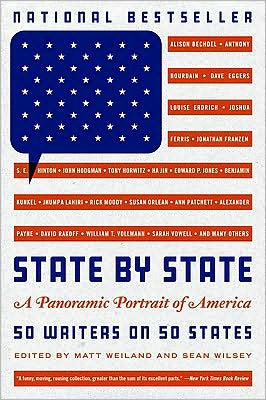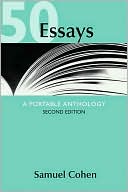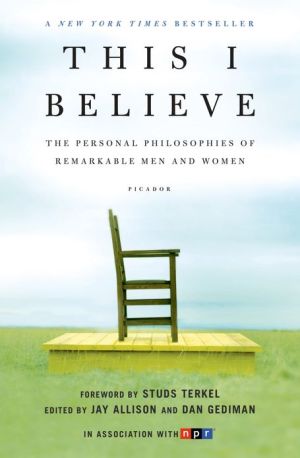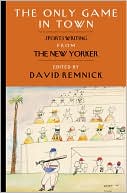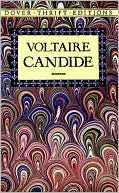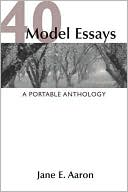State by State: A Panoramic Portrait of America
See America with 50 of Our Finest, Funniest, and Foremost Writers Anthony Bourdain chases the fumigation truck in Bergen County, New Jersey\ Dave Eggers tells it straight: Illinois is Number 1\ Louise Erdrich loses her bikini top in North Dakota\ Jonathan Franzen gets waylaid by New York's publicist...and personal attorney...and historian...and geologist\ John Hodgman explains why there is no such thing as a "Massachusettsean"\ Edward P. Jones makes the case: D.C. should be a state!\ Jhumpa...
Search in google:
See America with 50 of Our Finest, Funniest, and Foremost Writers Anthony Bourdain chases the fumigation truck in Bergen County, New JerseyDave Eggers tells it straight: Illinois is Number 1 Louise Erdrich loses her bikini top in North Dakota Jonathan Franzen gets waylaid by New York's publicist...and personal attorney...and historian...and geologistJohn Hodgman explains why there is no such thing as a "Massachusettsean"Edward P. Jones makes the case: D.C. should be a state! Jhumpa Lahiri declares her reckless love for the Rhode Island coastRick Moody explores the dark heart of Connecticut's Merritt Parkway, exit by exit Ann Patchett makes a pilgrimage to the Civil War site at Shiloh, TennesseeWilliam T. Vollmann visits a San Francisco S&M club and Many More!The Barnes & Noble Review"Where are you from?" Well, if you're not of the "born and raised in " variety, you know the question is complicated and emotional. Is it where you live presently, the place you were born, or perhaps where you spent the most time? I suspect that the answer lies deep in the soil of the place that one feels most "at home," where folks are not only familiar but share a common view. Sean Wilsey and Matt Weiland, the editors of State by State, inspired by the WPA Guides written during the Great Depression, have taken the notion one step further: to answer that question in a compilation of personal essays that distill the essence of each state, defining home through quirks, curiosities, and, of course, people. Venturing beyond the WPA Guides' sometimes stuffy summaries, Weiland explains that he asked each writer (an illustrious bunch of naturalized citizens and native sons and daughters, such as Jhumpa Lahiri, Anthony Bourdain, Jonathan Franzen, and Dave Eggers) to mine their personal archive of memory and produce a view of their home state that is "more personal, more eccentric and more partial." Opening with a tale describing Wilsey's own road trip foibles, the resulting patchwork of memoirs unfolds like the countryside before a windshield, at times shadowy and strange, at others comforting and familiar. Taken together, they act as a road map for a magical armchair journey winding through every state and spanning several decades. It's a memorable sojourn in one great big movable feast of a book filled with laughter and tears, nostalgia and hope, and a strong sense of place. --Lydia Dishman
State by State\ A Panoramic Portrait of America \ Chapter One\ Alabama\ \ Capital Montgomery\ Entered Union 1819 (22nd)\ Origin of name Possibly from a Choctaw Indian word meaning "thicket-clearers" or "vegetation-gatherers"\ Nickname Yellowhammer State\ Motto Audemus jura nostra defendere ("We dare defend our rights")\ Residents Alabamian or Alabaman\ U.S. Representatives 7\ State bird yellowhammer\ State flower camellia\ State tree Southern longleaf pine\ State song "Alabama"\ Land area 50,744 sq. mi.\ Geographic center In Chilton Co., 12 mi. SW of Clanton\ Population 4,557,808\ White 71.1%\ Black 26.0%\ American Indian 0.5%\ Asian 0.7%\ Hispanic/Latino 1.7%\ Under 18 26.3%\ 65 and over 13.0%\ Median age 35.8\ \ Alabama\ George Packer\ In the summer of 1980, when I was nineteen, I worked as a $600-a-month intern at a government-funded poverty law center in Alabama, renting a matchbox house with two black law students at the crumbling edge of downtown Mobile. It was a record hot summer, at a record high in urban seediness: Mobile, the poor man's New Orleans, was hollowed out by economic stagnation and the white exodus that followed desegregation. Carter was in the White House, the azaleas in Bienville Square were dead, and the sixteen blocks between the house and office offered the comfort of no trees, only the glare of the sun and an assortment of drunks, casual laborers, and pettycriminals. My yellow short-sleeved Oxford shirt, too heavy in the humidity, instantly marked me as a carpetbagger, and one morning a razor-thin limping man pursued me block after block, yelling, "Hey! Ass-hole!" Anomie set in the day I arrived—everything shut down for Memorial Day weekend—and pursued me all the way to my departure in August. At times it grew so intense that the only relief came in cups of mocha-flavored instant International Coffee, from a red-and-white tin, which I bought at a shop downtown and savored as the taste of civilization itself.\ The house on St. Francis Street had only one air-conditioner. Carlos, the law student to arrive first, grabbed it, and never let go. Cooled only by an ineffective fan, my room began to incubate turd-sized cockroaches. Carlos, from American University in Washington, despised me on sight. This was upsetting, because I had gone South with the idea of becoming a latter-day soldier in the civil rights struggle. I saw myself, in all modesty, as an heir to Schwerner and Goodman, the two white northerners killed in 1964 outside Philadelphia, Mississippi, with their black movement colleague Chaney. The Mother's Day melee when the Freedom Riders pulled into the Birmingham bus terminal, the fire hoses and K-9 squads in Linn Park, George Wallace standing in the doorway at the University of Alabama to prevent Vivian Malone and James Hood from becoming the first black students to attend—in my mind, all of this had happened the day before yesterday. My backpack carried Robert Coles's study of the psychology of black children during desegregation, Children of Crisis, Anne Moody's memoir of growing up black during the civil rights era, Coming of Age in Mississippi, and (because I accepted Black Power as a necessary stage of the movement) Eldridge Cleaver's Soul on Ice. But it was hard to sustain my own private freedom ride after I discovered that Carlos kept a personal roll of toilet paper in his bedroom, ferrying it back and forth to the john. So much for black and white together.\ That first weekend, before contempt had hardened into hatred, Carlos and I went out to get a bite to eat. A black neighbor saw us round the corner and exclaimed in wonder, "You black and you white but you both walking together!" Confronted with this nightmare tableau of black abjectness, white noblesse, and assumed interracial harmony, Carlos dispatched both the neighbor and me with a strained, sneering laugh. It was little consolation that Raymond, the other housemate, from Rutgers and gay, liked me fine.\ Carlos's rejection nagged at me all summer, but my civil rights romance was too strong to be snuffed out. The law center was opening satellite offices in the rural counties north of Mobile Bay, and I spent many days doing advance work by way of Greyhound buses to Monroeville and Evergreen. These were some of the poorest places in America. In Monroe County, which, according to the 1980 census, was 43 percent black, median white family income was $17,600 and median black family income was just over $9,000. Conecuh County was even poorer. I interviewed an old woman with a picture on the wall of her shack showing the two Kennedys and King under the words "The Three Who Set Us Free." She didn't seem very free: There was no indoor plumbing in the shack. The revolution of the early sixties had blown through the bigger cities in Alabama and barely touched these piney backwoods. "We get along just fine with our colored folks," the probate judge of Monroe County told me, sounding like a hundred years of predecessors.\ I was looking for something—marches, drama, self-sacrifice, community, history—that now existed only in books. Less than two decades before, when Coles was working as a child psychiatrist amid the upheavals of southern desegregation, a young black civil rights worker told him that he'd joined the movement because "I'll be lucky if I can vote, and be treated better than a dog every time I go to register my car, or try for a driving license, or go to buy something in a store." By 1980, what was left of the movement had migrated behind the closed doors of the courts. The law center was involved in several important civil rights suits, including desegregation and voting rights cases against the Mobile school board and county commission, but these were moving slowly, obscurely, through the legal system. Class-action lawsuits were not what I had in mind that summer. I wanted the sight of headlights in my rearview mirror on a rural road. In fact, the Klan still operated in Mobile, as the country learned just a few months later, in March 1981, when two of its members randomly lynched a nineteen-year-old black youth on a city street. (Eventually they were convicted, and one was electrocuted in the first execution of a white man for the murder of a black man in Alabama since 1913. The United Klans of America was later bankrupted by a civil suit that forced the Alabama chapter to turn over its Tuscaloosa meeting hall to the victim's mother, who used the proceeds to buy her first house.) But the main battle for equality in Alabama and the South was over. I had arrived in time for its ambiguous and incomplete aftermath: superficial civility, de facto segregation, economic inequality, with most of the stirring old words gone stale from sloganeering. As Carlos made clear, laws did not change hearts.\ State by State\ A Panoramic Portrait of America. Copyright © by Matt Weiland. Reprinted by permission of HarperCollins Publishers, Inc. All rights reserved. Available now wherever books are sold.
Preface Matt Weiland Weiland, MattIntroduction Sean Wilsey Wilsey, SeanAlabama George Packer Packer, George 3Alaska Paul Greenberg Greenberg, Paul 15Arizona Lydia Millet Millet, Lydia 26Arkansas KevinBrockmeier 35California William T. Vollmann Vollmann, William T. 42Colorado Benjamin Kunkel Kunkel, Benjamin 56Connecticut Rick Moody Moody, Rick 66Delaware Craig Taylor Taylor, Craig 77Florida Joshua Ferris Ferris, Joshua 90Georgia He Jin He, Jin 103Hawaii Tara Bray Smith Smith, Tara Bray 111Idaho y Anthony Doerr Doerr, y Anthony 120Illinois Dave Eggers Eggers, Dave 129Indiana Susan Choi Choi, Susan 141Iowa Dagoberto Gilb Gilb, Dagoberto 154Kansas Jim Lewis Lewis, Jim 167Kentucky John Jeremiah Sullivan Sullivan, John Jeremiah 173Louisiana Joshua Clark Clark, Joshua 182Maine y Heidi Julavits Julavits, y Heidi 194Maryland Myla Goldberg Goldberg, Myla 203Massachusetts John Hodgman Hodgman, John 209Michigan Mohammed Naseehu Ali Ali, Mohammed Naseehu 223Minnesota Philip Connors Connors, Philip 232Mississippi Barry Hannah Hannah, Barry 241Missouri Jacki Lyden Lyden, Jacki 248Montana Sarah Vowell Vowell, Sarah 260Nebraska Alexander Payne Payne, Alexander 265Nevada Charles Bock Bock, Charles 274New Hampshire Will Blythe Blythe, Will 287New Jersey Anthony Bourdain Bourdain, Anthony 300New Mexico Ellery Washington Washington, Ellery 308New York Jonathan Franzen Franzen, Jonathan 320North Carolina Randall Kenan Kenan, Randall 339North Dakota Louise Erdrich Erdrich, Louise 348Ohio Susan Orlean Orlean, Susan 357Oklahoma S. E. Hinton Hinton, S. E. 363Oregon Joe Sacco Sacco, Joe368Pennsylvania Andrea Lee Lee, Andrea 377Rhode Island Jhumpa Lahiri Lahiri, Jhumpa 391South Carolina Jack Hitt Hitt, Jack 402South Dakota Soid Sayrafiezadeh Sayrafiezadeh, Soid 415Tennessee Ann Patchett Patchett, Ann 428Texas Cristina Henriquez Henriquez, Cristina 435Utah David Rakoff Rakoff, David 447Vermont Alison Bechde Bechde, Alison 460Virginia TonyHorwitz 469Washington Carrie Brownstein Brownstein, Carrie 479West Virginia Jayne Anne Phillips Phillips, Jayne Anne 487Wisconsin Daphne Beal Beal, Daphne 501Wyoming Alexandra Fuller Fuller, Alexandra 514Afterword: Washington, D.C.- A Conversation with Edward P. Jones 525
\ New York Times Book Review"[State by State] is a funny, moving, rousing collection, greater than the sum of its excellent parts, a convention of literary superdelegates, each one boisterously nominating his or her piece of the Republic."\ \ \ \ \ New York Post"An enjoyable journey: 50 essays, cartoons and mini-plays, plus an afterward about Washington, DC and a fascinating appendix…all in all, it makes one yearn for a driver’s license and a stretch of open highway."\ \ \ Entertainment Weekly"This eclectic collection of essays describing the ordinary people and places within our 50 states is as essential as the Rand McNally atlas. Alternately brash and bashful...each literary foray in State by State is well worth the trip. Grade: A."\ \ \ \ \ Seattle Post-Intelligencer"Fascinating."\ \ \ \ \ Los Angeles Times"Odds are, reading STATE BY STATE, that you’ll fall for every state a little, even if they remain tremendously hard to explain."\ \ \ \ \ Salon.com"Ideal nightstand reading and a welcome reminder of the pluribus behind the unum."\ \ \ \ \ Entertainment Weekly“This eclectic collection of essays describing the ordinary people and places within our 50 states is as essential as the Rand McNally atlas. Alternately brash and bashful...each literary foray in State by State is well worth the trip. Grade: A.”\ \ \ \ \ Los Angeles Times“Odds are, reading STATE BY STATE, that you’ll fall for every state a little, even if they remain tremendously hard to explain.”\ \ \ \ \ New York Times Book Review“[State by State] is a funny, moving, rousing collection, greater than the sum of its excellent parts, a convention of literary superdelegates, each one boisterously nominating his or her piece of the Republic.”\ \ \ \ \ New York Post“An enjoyable journey: 50 essays, cartoons and mini-plays, plus an afterward about Washington, DC and a fascinating appendix…all in all, it makes one yearn for a driver’s license and a stretch of open highway.”\ \ \ \ \ Seattle Post-Intelligencer“Fascinating.”\ \ \ \ \ Salon.com“Ideal nightstand reading and a welcome reminder of the pluribus behind the unum.”\ \ \ \ \ J. R. MoehringerTaking as their inspiration the state guides published by the Federal Writers' Project during and shortly after the Great Depression, Weiland and Wilsey assembled 50 of America's finest writers and asked them to contribute essays on the same general theme: why my state is special—or not. The result is a funny, moving, rousing collection, greater than the sum of its excellent parts, a convention of literary superdelegates, each one boisterously nominating his or her piece of the Republic.\ —The New York Times\ \ \ \ \ Publishers WeeklyWithout leaving home or spending a cent on gas, readers of this book can enjoy a scenic view of the entire U.S. that is as familiar as it is disorienting. Weiland, deputy editor of the Paris Review, and Wilsey, editor-at-large for McSweeney's, have gathered a group of 50 disparate voices to explore not just their experience in America, but the way each state was presented in the American Guide series of the Federal Writers Project in the 1930s, in which the Works Project Administration (WPA), as part of F.D.R's New Deal, put more than 6000 American writers to work creating a portrait of this country. The editors wanted "to make a book inspired by the ideals behind the WPA Guides" but they also wanted "something more personal, more eccentric, and more partial." Obvious heavy-hitters-Dave Eggars (Illinois), Rick Moody (Connecticut), Jhumpa Lahiri (Rhode Island), Barry Hannah (Mississippi), William T. Vollmann (California)-are included, as well as some wonderful surprises. Alison Bechdel's illustrated story about her life after moving to Vermont brilliantly combines personal history with historical fact, as does Charles Bock's essay on growing up and working in his parent's Las Vegas pawnshop. Mohammed Naseehu Ali's tale of life in Michigan, after moving there from Ghana as a teen, illuminates what the "unconditionally generous" Michigan nature shares with the traditions of his own Hausa-Islamic culture. And Franzen's imaginary "interview" with the state of New York is perhaps the high point among this collection of beguiling summations of something all the writers share: a love-hate relationship with how their chosen state has changed and evolved during the course of theirlives. (Sept.)\ Copyright © Reed Business Information, a division of Reed Elsevier Inc. All rights reserved.\ \ \ \ \ Library JournalWeiland (deputy editor, Paris Review) and Wilsey, who coedited The Thinking Fan's Guide to the World Cup, were inspired by the famous WPA guides of the 1930s to bring together this collection of original essays. Each piece here may be smaller in scope than the original WPA state guides, but the overall editorial task is ambitious. Consisting of 50 essays from 50 different authors, including Dave Eggers (Illinois), Anthony Bourdain (New Jersey), S.E. Hinton (Oklahoma), and Jhumpa Lahiri (Rhode Island), this work aims to provide more than mere demographic information about each state (though it does include that). Each also offers a personal, distinct, and often humorous look at the state in question. Particularly inventive are two pieces told in the style of graphic novels, one by Joe Sacco (Oregon) and the other by Alison Bechdel (Vermont). Readers with an interest in the endless variety of attitudes, lifestyles, viewpoints, and experiences to be found across America will enjoy this work. Recommended for public libraries.\ —Elizabeth L. Winter\ \ \ \ \ \ Kirkus ReviewsSelf-consciously modeled after state guides sponsored by the Federal Writers' Project in the 1930s, this ambitious effort features a terrific roster of writers and arrives just in time for the November elections. Best here are the immigrant stories: Mohammed Naseehu Ali's reflections on his introduction to America's generosity as a Ghanaian high-school student at a Michigan arts academy; Ha Jin's account of his early years developing as a writer in Georgia; Jhumpa Lahiri's informative memoir about growing up in Rhode Island. Jack Hitt writes hilariously of the South Carolina temperament, made up of "easy rage, china-shop recklessness and merry eccentricity"-and he's from the genteel outpost of Charleston. Jonathan Franzen invents a lame interview with a couple of New York State lackeys eager to give him the official scoop, while Lydia Millet offers an openly hostile view of Arizona and the wasteful populace that doesn't value it. But many writers display genuine love for their state, alongside satisfactory morsels of truth, as in Ann Patchett's monologue on changes she's witnessed over the years in Tennessee, Alison Bechdel's charming cartoon about her life in Vermont, William T. Vollmann's expression of enduring faith in California and Philip Connors's riff on the phenomenon of the "Minnesota Nice." Others-seemingly all New Yorkers-briefly pass through their assigned state on vacation: Said Sayrafiezadeh in South Dakota, David Rakoff in Utah and Will Blythe in New Hampshire, whose "paradoxical pride in one's modesty" he likens to that of the natives in his natal North Carolina. Susan Orlean puts to bed the myths about Ohio, and Andrea Lee, raised in Philadelphia, expresses her conflictedfeelings about the utopian ideals of her birth state. Like most anthologies, it's uneven, and individual essays are somewhat narrow in focus. But Paris Review deputy editor Weiland and McSweeney's editor at large Wilsey (co-editors: The Thinking Fan's Guide to the World Cup, 2006, etc.) keep it positive and heartfelt. Ranges from delights to self-indulgent snores.\ \ \ \ \ The Barnes & Noble ReviewWhere are you from? Well, if you're not of the "born and raised in..." variety, you know the question is complicated and emotional. Is it where you live presently, the place you were born, or perhaps where you spent the most time? I suspect that the answer lies deep in the soil of the place that one feels most "at home," where folks are not only familiar but share a common view. Sean Wilsey and Matt Weiland, the editors of State by State, inspired by the WPA Guides written during the Great Depression, have taken the notion one step further: to answer that question in a compilation of personal essays that distill the essence of each state, defining home through quirks, curiosities, and, of course, people. Venturing beyond the WPA Guides' sometimes stuffy summaries, Weiland explains that he asked each writer (an illustrious bunch of naturalized citizens and native sons and daughters, such as Jhumpa Lahiri, Anthony Bourdain, Jonathan Franzen, and Dave Eggers) to mine their personal archive of memory and produce a view of their home state that is "more personal, more eccentric and more partial." Opening with a tale describing Wilsey's own road trip foibles, the resulting patchwork of memoirs unfolds like the countryside before a windshield, at times shadowy and strange, at others comforting and familiar. Taken together, they act as a road map for a magical armchair journey winding through every state and spanning several decades. It's a memorable sojourn in one great big movable feast of a book filled with laughter and tears, nostalgia and hope, and a strong sense of place. --Lydia Dishman\ \
